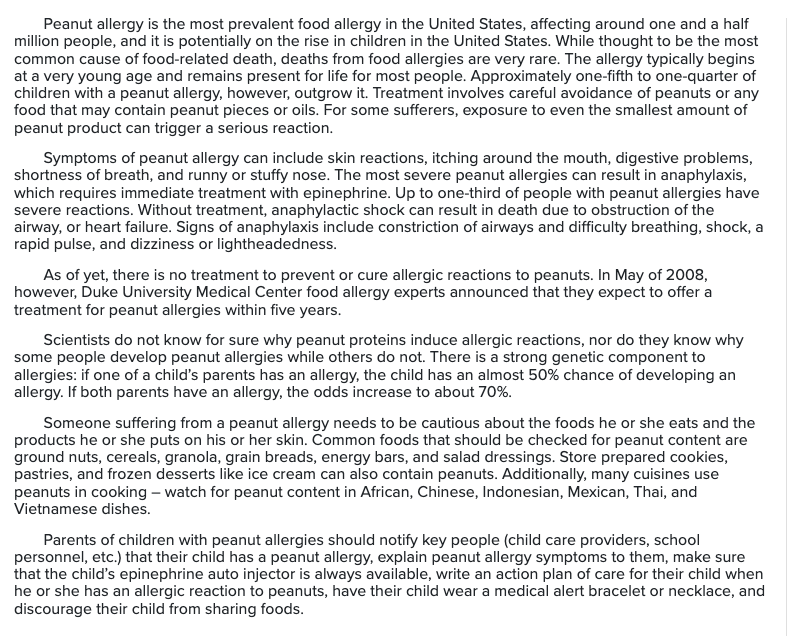
Explanation:
The second paragraph of the passage notes that ""up to one-third of people with peanut allergies have severe reactions."" Since one-third is approximately 33%, choice C is correct.
Explanation:
The second paragraph of the passage notes that in 2008, Duke experts stated that they expected to offer treatment in five years. Five years from 2008 is 2013.
Explanation:
The last sentence in paragraph five lists the cuisines in which one should watch for peanuts. Italian is not listed.
Explanation:
The second sentence of the first paragraph states that peanut allergy is the most common cause of food-related death.
Explanation:
Paragraph two gives examples of symptoms of peanut allergies and, more specifically, examples of symptoms of anaphylaxis. A runny or stuffy nose is given as a symptom of the former, but not of the latter.
Explanation:
Improve is a synonym for ameliorate, both of which mean "to make better." Intensify is similar, but this word implies an effort greater in degree or measurement. Worsen is the antonym meaning, "to become worse or less in value." Cure could fit into this sentence, as it means, "to effect recovery from," but does not relate directly to ameliorate.
Explanation:
Emotional is the only true synonym for fervent, which means "showing great depth of feeling or passionate enthusiasm." Therefore, dispassionate, which means "uninfluenced by emotion or personal feelings," is an antonym. Enthusiastic implies urgency of desire or interest, and this word is synonymous with eager. Lengthy (or long) is unrelated to the term fervent.
Advertisement
Explanation:
Obsolete and outmoded are synonyms, both connoting "having surpassed its time of use or usefulness." Worn-out is related, but this word suggests something is "damaged or weakened through prolonged use." In this context, inoperable describes something "not workable or practical," making it a related word as well. Refurbished means, "restored to good repair," and is a near antonym.
Explanation:
Wet and saturated are synonyms, both meaning "covered with, containing, or penetrated with liquid." Inundated is a related term in this case meaning, "flooded," but this word can also mean "overwhelmed." Similarly, steeped means, "soaked or immersed in liquid." In this sentence, caked would mean, "forming a crust."
Explanation:
Affected is the synonym for feigned because in this instance both words mean, "presenting a false appearance of." Concealed is a somewhat related term signifying that something is "hidden." The other choices fit into the sentence and are synonyms for each other; as verbs, undergone and experienced both mean, "having come to knowledge of something by living through it."
Explanation:
An exponent is an advocate, someone who actively promotes or favors a cause. Adherent is a somewhat related term meaning, "follower, someone who follows the opinions or teachings of others." Opponent is an antonym signifying, "one who takes an opposing position." Critic is a near antonym, which in this sentence would mean "fault-finder."